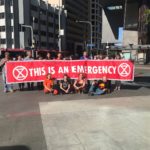Leader of Pro-Rape Group Wants to Come to Australia

Daryush ‘Roosh’ Valizadeh is a man with very twisted views – he believes ‘a woman’s value significantly depends on her fertility and beauty,’ while ‘a man’s value significantly depends on his resources, intellect, and character’.
But most controversially, Valizadeh says it should be legal to sexually assault women on private property. He has also become known for his homophobic views, recently posting:
‘The legalisation of gay marriage [is] a full frontal attack on heterosexual men…one phase of a degenerate march to persecute heterosexuals, both legally and socially, while acclimating young children to the homosexual lifestyle.’
The self-confessed ‘neomasculinist’ and ‘pick up artist’ heads the US-based group ‘Return of Kings,’ which seeks to recruit like-minded men to spread its sexist and homophobic message around the world.
Thus far, the group has only existed online – but Valizadeh recently announced a series of international gatherings in over 40 countries – including in Australia this Saturday, 6th of February.
Notably, Valizadeh says he intends to travel to Australia to attend the gathering in person, inviting ‘attractive Australian girls in age range of 18-22’ to contact him.
The Reaction
Valizadeh’s announcement has been met with fierce opposition, with everyone from politicians to celebrities denouncing the group’s views and intentions.
Immigration Minister Peter Dutton told the media that he would refuse Valizadeh a visa – but the ‘neomasculinist’ remains undeterred, stating:
‘I don’t need to apply for a visa if I’m coming in by boat. The border is like Swiss cheese…I will sneak in to your country, hold my meetings, laugh, and then slip out. Your authorities won’t stop me.’
In a subsequent Twitter post, Valizadeh bragged that he will ‘take a private boat to Darwin from Indonesia or East Timor.’
Australians Rally
While Valizadeh remains confident about entering the country, it seems that most Australians don’t want him here – with over 38,000 signing an online petition to stop the gatherings from going ahead.
On top of this, several politicians have publicly denounced the group, with Labor MP Richard Marles tweeting, ‘Return of Kings are no more than a pack of dunces. Views have no place here.’
Meanwhile, Opposition Senate Leader Penny Wong has stated ‘those views and that type of campaigning and organisation has no place in Australia.’
Australian talk show host Waleed Aly also blasted Valizadeh on Channel 10’s The Project last night, encouraging viewers to ‘hijack’ his campaign by not giving him any attention, and instead using the opportunity to focus on services that benefit women, such as refuges. Aly stated:
‘It is that sort of revolting, provocative statement that catches our attention…Once the mainstream media takes the bait, Roosh trolls the public through his various social media channels, revelling in the free publicity and extending the life of the news story…Instead of linking to articles about Roosh V or responding to his calculated, vile tweets which just keep him trending, I challenge you to click something else. Specifically, click on your social media and share a link to Lou’s Place. This is a women’s refuge in Sydney.’
Perhaps Aly has a valid point – rather than being deterred by the media controversy, Valizadeh appears to thrive on bad publicity. A recent post to his Twitter account reads:
‘I love how I can trigger entire countries and get women clutching their pearls without stepping foot inside them.’
Discrimination Laws in Australia
Even if Valizadeh were to somehow survive the treacherous boat journey from Indonesia to Darwin, sneak in to Australia without alerting authorities and travel from Darwin to Sydney undetected, he could be liable under anti-discrimination laws for espousing his hateful views.
The Anti-Discrimination Act (NSW) contains provisions against vilification on the grounds of homosexuality, transgender orientation, race or HIV/AIDS status.
‘Vilification’ refers to situations where ‘someone does something publicly that could encourage hatred, serious contempt or severe ridicule.’
‘Serious vilification’ is when a person or group publicly incites hatred or severe ridicule of a person or group on one of the above grounds, and their conduct includes threatening or inciting others to threaten physical harm towards or towards property owned by that person. The offence carries a maximum penalty of $5,500 and/or 6 months imprisonment.
Complaints of serious vilification can be referred to the President of the Anti-Discrimination Board for investigation, who can then refer them to the Attorney General for prosecution.
Although the Act does not make it illegal to vilify women because of their sex, it does contain provisions outlawing sexual harassment, which includes any ‘unwelcome sexual advance, or an unwelcome request for sexual favours, to the other person,’ or any other form of ‘unwelcome conduct of a sexual nature’ towards another person ‘in circumstances in which a reasonable person, having regard to all the circumstances, would have anticipated that the other person would be offended, humiliated or intimidated.’
A Threat to Free Speech?
Supporters of those who espouse controversial views often argue that anti-discrimination laws present a threat to freedom of speech.
In 2009, conservative commentator Andrew Bolt came under fire after publishing two columns which attacked Indigenous Australians; implying that they identified as Aboriginal for ‘personal gain.’
After a highly publicised court dispute, Bolt was forced to publicly apologise, pay legal costs, and comply with an order preventing his articles from being republished.
He subsequently campaigned to have section 18C of the Racial Discrimination Act overturned – arguing that it interfered with free speech.
Freedom of speech is a limited privilege in Australia – and most people use it responsibly. Free speech is not a ‘right’ in so far as it is not generally protected by the Constitution (although we do have an implied freedom of political communication), and of course Australia does not have a Bill of Rights.
Free speech is vital to promote open discussion and broaden our knowledge pool – indeed, society has been immeasurably enriched through the ability of individuals to openly express and debate unpopular views, without fear of persecution.
However, as Newtown Lee points out ‘there is a fine line between free speech and hate speech. Free speech encourages debate whereas hate speech incites violence’.
There is certainly an argument that Valizadeh’s statements fall into the latter category.






